|
|
|
Sort Order |
|
|
|
Items / Page
|
|
|
|
|
|
|
| Srl | Item |
| 1 |
ID:
132326
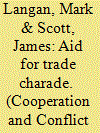

|
|
|
|
|
| Publication |
2014.
|
| Summary/Abstract |
Aid for Trade (AfT) has gained prominence as an innovative form of donor support in the 'post'-Washington Consensus. AfT mechanisms have been praised as a means of aligning trade liberalisation deals (whether in the Doha Round or within bilaterals) to poverty reduction objectives. This article, through critical analysis of AfT discourse within the 'moral economies' of multilateral World Trade Organization and bilateral European Union-African, Caribbean and Pacific negotiations, points to the strategic purposes of donor language in rationalising asymmetric North-South trade systems. Moreover, it questions the 'development' credentials of AfT assistance by examining some of the ensuing private sector activities and the impact on the supposed beneficiaries, and the tying of AfT disbursements to the implementation of inappropriate policies.
|
|
|
|
|
|
|
|
|
|
|
|
|
|
|
|
| 2 |
ID:
184897
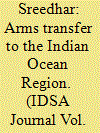

|
|
|
| 3 |
ID:
126516
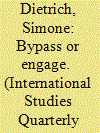

|
|
|
|
|
| Publication |
2013.
|
| Summary/Abstract |
The conventional wisdom in the literature on aid allocation suggests that donors utilize bilateral aid as a tool to buy influence in the aid-receiving country. Those who conclude that aid is driven by donor self-interest focus on government-to-government aid transfers. However, this approach overlooks important variation in delivery tactics: Bilateral donors frequently provide aid to nonstate actors. This paper argues that donors resort to delivery tactics that increase the likelihood of aid achieving its intended outcome. In poorly governed recipient countries, donors bypass recipient governments and deliver more aid through nonstate actors, all else equal. In recipient countries with higher governance quality, donors engage the government and give more aid through the government-to-government channel. Using OLS and Probit regressions, I find empirical support for this argument. Understanding the determinants of donor delivery tactics has important implications for assessing aid effectiveness.
|
|
|
|
|
|
|
|
|
|
|
|
|
|
|
|
| 4 |
ID:
184431
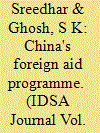

|
|
|
| 5 |
ID:
133614
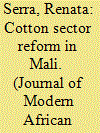

|
|
|
|
|
| Publication |
2014.
|
| Summary/Abstract |
This paper provides a detailed analysis of the cotton sector reform process in Mali from 2000 to 2011, explaining reform delays and ambiguities in terms of the wider political and socio-economic context and aid relationships. Contrary to arguments pointing to lack of state commitment and ownership, domestic stakeholders increasingly worked towards finding an acceptable and consensual reform package. The process encountered quite serious obstacles, however, due to divergent actors' incentives, and the existence of opposing philosophies about what a restructured cotton sector should look like. As a consequence of donors' misjudgement of the political and social realities underlying the Malian cotton sector, dialogue among stakeholders was difficult and polarised, forcing the government to spend considerable time and resources to find a suitable compromise. This paper contributes to a better understanding of the merits and limits of pursuing consensual policy processes against the constraints posed by divergent donors' policy paradigms.
|
|
|
|
|
|
|
|
|
|
|
|
|
|
|
|
| 6 |
ID:
134123
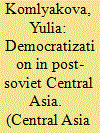

|
|
|
|
|
| Publication |
2014.
|
| Summary/Abstract |
The author analyzes how the Central Asian countries (Kazakhstan, Uzbekistan, and Kyrgyzstan) are moving toward democracy, as well as the political and geopolitical reasons behind the United States' interest in the region triggered by the Soviet Union's disintegration and Washington's desire to consolidate its position in the post-Soviet space. It was determined to realize its interests by planting democratic values in the newly independent states and urging them to orientate themselves toward democratic principles when shaping their policies. In this way, the Central Asian countries could count on Washington's political support and economic aid.
In an effort to enter the world scene as democratic states, the Central Asian countries built state structures that relied on constitutions describing them as democratic states; they created a party and election system and passed laws on the freedom of speech, glasnost, etc. This, however, has not transformed the post-Soviet Central Asian republics into paragons of democracy: the clan system is very much alive in the corridors of power; Soviet mentality remains predominant among state officials (practically all the top figures preserved their posts in the newly independent states); and the influence of Russia and the authoritarian traditions inherited from the past is still very obvious.
|
|
|
|
|
|
|
|
|
|
|
|
|
|
|
|
| 7 |
ID:
133707
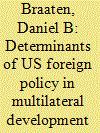

|
|
|
|
|
| Publication |
2014.
|
| Summary/Abstract |
The purpose of this study is to identify and explain recent US human rights policy in the Multilateral Development Banks (MDBs). Foreign aid, whether distributed directly (bilateral aid) or indirectly through multilateral institutions such as the MDBs, is one of several tools through which the USA furthers its human rights policy. Several studies show the conflicted human rights policies the USA pursues with bilateral aid, but very few examine the role of human rights in US multilateral aid policy. It is this deficit that the present study addresses by examining what factors determine how the USA votes on proposals before the Executive Board in the various MDBs. Using a multinomial logistic regression model I test whether US votes in the MDBs are conditioned on recipient countries' respect for human rights along with other strategic interest variables. The study finds that respect for political rights has an important role in determining US votes in the MDBs although much of the impact is accounted for by votes specifically against China. Conversely, respect for rights of personal integrity do not have an impact on US voting. Level of economic development and whether the country receives military aid from the USA are also important determinants of US votes, as well as the level of trade between the USA and the recipient country.
|
|
|
|
|
|
|
|
|
|
|
|
|
|
|
|
| 8 |
ID:
127807
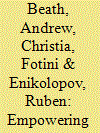

|
|
|
|
|
| Publication |
2013.
|
| Summary/Abstract |
In societies with widespread gender discrimination, development programs with gender quotas are considered a way to improve women's economic, political, and social status. Using a randomized field experiment across 500 Afghan villages, we examine the effects of a development program that mandates female participation. We find that even in a highly conservative context like Afghanistan, such initiatives improve outcomes specific to female participation in some economic, social, and political activities, including increased mobility and income generation. They, however, produce no change in more entrenched female roles linked to family decision-making or in attitudes toward the general role of women in society.
|
|
|
|
|
|
|
|
|
|
|
|
|
|
|
|
| 9 |
ID:
092325
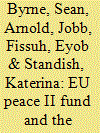

|
|
|
|
|
| Publication |
2009.
|
| Summary/Abstract |
Economic aid is one component of peacebuilding that has been given increasing prominence in its ability to build both sustainable peace and development. This article analyses the impact of economic aid on peacebuilding initiatives, looking at the case study of Northern Ireland. Through qualitative and quantitative data analysis, this article addresses whether international economic assistance is able to target the structural forces that have been known to exacerbate ethnic conflicts, and points to both its successes and failures in the perception of the civilian population.
|
|
|
|
|
|
|
|
|
|
|
|
|
|
|
|
| 10 |
ID:
128982
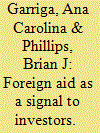

|
|
|
|
|
| Publication |
2014.
|
| Summary/Abstract |
Does development aid attract foreign direct investment (FDI) in post-conflict countries? This article contributes to the growing literature on effects of aid and on determinants of FDI by explaining how development aid in low-information environments is a signal that can attract investment. Before investing abroad, firms seek data on potential host countries. In post-conflict countries, reliable information is poor, in part because governments face unusual incentives to misrepresent information. In these conditions, firms look to signals. One is development aid, because donors tend to give more to countries they trust to properly handle the funds. Our results show that aid seems to draw FDI-however, this is conditional on whether the aid can be considered geostrategically motivated. We also show that this effect decreases as time elapses after the conflict. This suggests that aid's signaling effect is specific to low-information environments, and helps rule out alternative causal mechanisms linking aid and FDI.
aid
|
|
|
|
|
|
|
|
|
|
|
|
|
|
|
|
| 11 |
ID:
131329
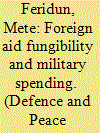

|
|
|
|
|
| Publication |
2014.
|
| Summary/Abstract |
The present article examines if the foreign aid to North Cyprus is fungible and if it is in a long-run equilibrium relationship with military spending using the Autoregressive Distributed Lag bounds testing procedure from 1977 to 2007. The results suggest that neither tax revenues nor public expenditures are in a long-run equilibrium relationship with foreign aid. However, strong evidence emerges that defence expenditures are in a long-run equilibrium relationship with foreign aid, and that the latter seem to cause the former.
|
|
|
|
|
|
|
|
|
|
|
|
|
|
|
|
| 12 |
ID:
128881
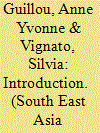

|
|
|
|
|
| Publication |
2013.
|
| Summary/Abstract |
This Special Focus is the second part of 'Life after collective death in South East Asia', a collection of papers examining what happens after wide-scale destruction has occurred and how the social and individual lives of the survivors recover. Part 1, published in South East Asia Research in June 2012 (Vol 20, No 2), focused on the social and religious processes that help the '(re-)fabrication of social bonds'. Part 2 deals with another major aspect of resilience - the issue of help, especially in the case of international humanitarian aid. In many ways, in the contemporary situation, it is taken for granted that help will be provided. We question the evidence for this, asking what rationales are involved in post-catastrophe help. We shed light on why, for example, people decide to engage in non-governmental organizations (NGOs) to help distribute drugs in a Cambodian outpatients ward or, alternatively, to carry rice sacks in the Ayeyarwady Delta to help victims of the typhoon in Myanmar. We highlight why people in the West consider such activities 'normal'. We focus on how people, having been labelled as 'victims', receive and perceive such aid and how they respond to it. Further, we ask how (and to what extent) aid contributes to change, implicitly or explicitly, in the societies affected. Finally, we question what contemporary international aid brings when compared to the older local relief systems and systems of mutual help, particularly those examined in Part 1.
|
|
|
|
|
|
|
|
|
|
|
|
|
|
|
|
| 13 |
ID:
131744
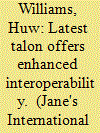

|
|
|
|
|
| Publication |
2014.
|
| Summary/Abstract |
QinetiQ North America (NA) has used internal funding to developed its latest talon unmanned ground vehicle (UGV), HIS Jane's has learned.
|
|
|
|
|
|
|
|
|
|
|
|
|
|
|
|
| 14 |
ID:
131662
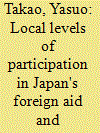

|
|
|
|
|
| Publication |
2014.
|
| Summary/Abstract |
This study will examine the determinants of local Japanese government involvement in decentralized international cooperation by taking an actor-specific approach to three outstanding cases: Shiga Prefecture, Kitakyushu City, and Yokohama City. It will look beneath the aggregate relationships to more qualitative evidence of localized motives for Japanese cooperation with developing countries.
|
|
|
|
|
|
|
|
|
|
|
|
|
|
|
|
| 15 |
ID:
063109
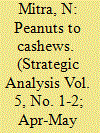

|
|
|
|
|
| Publication |
Apr-May 1981.
|
|
|
|
|
|
|
|
|
|
|
|
|
|
|
|
| 16 |
ID:
126579
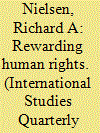

|
|
|
|
|
| Publication |
2013.
|
| Summary/Abstract |
This article provides theoretical and empirical solutions to two connected puzzles in the study of foreign aid and human rights: Do foreign aid donors use aid sanctions to punish repressive states, and if so, why? I show that donors impose aid sanctions selectively. Aid sanctions typically occur when repressive states do not have close political ties to aid donors, when violations have negative consequences for donors and when violations are widely publicized. Using a data set of bilateral foreign aid to 118 developing countries between 1981 and 2004, I find that variation in these factors largely accounts for the differing aid sanctions that result from objectively similar rights violations by the governments of developing countries.
|
|
|
|
|
|
|
|
|
|
|
|
|
|
|
|
| 17 |
ID:
130708
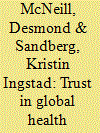

|
|
|
|
|
| Publication |
2014.
|
| Summary/Abstract |
The Global Alliance for Vaccines and Immunization provides a most interesting example of effective cooperation between international organizations-especially the World Health Organization, the UN Children's Fund, and the World Bank. Based on extensive research and interviews, this article examines how and why this cooperation came about. The role of the Gates Foundation in providing massive financial support was certainly crucial. An adequate explanation must, however, involve more than what might be called "buying cooperation"; trust played a crucial role. By studying this particular case in detail, this article raises some interesting theoretical issues about the role of trust in global governance.
|
|
|
|
|
|
|
|
|
|
|
|
|
|
|
|
| 18 |
ID:
121162
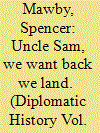

|
|
|
|
|
| Publication |
2012.
|
| Summary/Abstract |
The American acquisition of military and naval facilities at Chaguaramas in Trinidad during World War II led to a significant Anglo-American controversy during the late 1950s. In 1957 the Chief Minister of Trinidad, Eric Williams, began a campaign to eject the Americans from the base. Members of the Eisenhower administration regarded the campaign as evidence of anti-Americanism and the US Navy sought to undermine Williams by cooperating with his opponents. This interference was resented by British policy-makers who were planning to grant independence to Trinidad as part of a West Indian federation. The resulting Anglo-American disagreement continued until a compromise, which allowed the United States to retain the base in return for economic aid, was reached in 1961. The episode is significant in demonstrating that Washington was concerned about incipient anti-Americanism within the Anglophone Caribbean and in signifying British determination to defend their remaining colonial interests after the Suez crisis.
|
|
|
|
|
|
|
|
|
|
|
|
|
|
|
|
| 19 |
ID:
030752
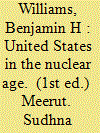

|
|
|
|
|
| Edition |
1st ed.
|
| Publication |
Meerut, Sudhna Prakashan, 19??.
|
| Description |
253p.hbk
|
|
|
|
|
|
|
|
|
|
|
|
Copies: C:1/I:0,R:0,Q:0
Circulation
| Accession# | Call# | Current Location | Status | Policy | Location |
| 004411 | 973/WIL 004411 | Main | On Shelf | General | |
|
|
|
|
| 20 |
ID:
128883
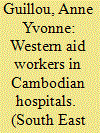

|
|
|
|
|
| Publication |
2013.
|
| Summary/Abstract |
Since the Khmer Rouge genocide (1975-79), Cambodia has been constructed as a victim par excellence, which exists only through Western financial aid and compassion. In this ideological context, non-governmental organizations (NGOs) mushroomed by the hundreds in the 1980s in the refugee camps along the Cambodia-Thailand border. They then flowed into Cambodia during the repatriation process under UNHCR supervision in the early 1990s. Because of the financial weakness of the Cambodian government at that time (when support from the USSR and other socialist countries abruptly ceased), the NGOs gained a powerful position as institutional partners of the government. Taking the example of the medical sector, this article analyses humanitarian ideology and its implementation in Cambodian hospitals in the 1990s. The author explores the contradiction between the Westerners' 'philosophy of development' versus the Cambodians' 'ethic of gift', based on an ethnographical account of the daily activities in Cambodian hospitals, from an interactionist perspective. The author observes the interactions between the Cambodian staff, the humanitarian NGO staff, the patients and their families, showing how the divergence of moral values, the historical construction of the medical profession and social games create conflict between the humanitarians and the Cambodians. This has a direct impact on the patient-physician relationship. Finally, while millions of dollars and thousands of hours of humanitarian work have been spent in Cambodia, some major public health indices have not been greatly improved.
|
|
|
|
|
|
|
|
|
|
|
|
|
|
|
|
|
|
|
|
|